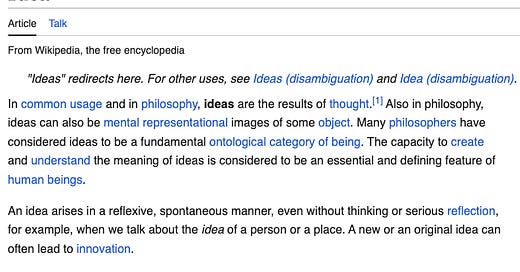You cannot force yourself to have good ideas
You are in the first few months of a new project (perhaps your PhD or your master’s), and you are trying to come up with a good idea. You tell yourself that it cannot only be good, it has to be groundbreaking. You can already picture people screaming your name when you win a Nobel prize.
You start reading every single thing you can find about the topic and every single article you read feels like it’s stolen your thunder. It seems as though every angle, every “fresh” perspective, has already been covered by someone else, and you start telling yourself “damn it, these people have stolen all my ideas already”. And so you dig deeper, filling notebooks with sketches and bullet points, scrawling down thoughts that seem to make sense until they don’t. The more you read, the harder it feels to stumble upon that "perfect" concept, that elusive research question that is both new and important. And you ask yourself, how is it possible that I haven’t managed to come up with a conceptually-sound, methodologically-innovative, timely and policy-relevant research puzzle in my first week of research?
Why You Can’t Force a Brilliant Idea
Sorry to break it to you, but the reality is that you cannot force yourself to have great ideas. Creativity doesn’t respond to pressure in the same way productivity does; it flourishes in moments of serendipity, in settings where ideas have the space to unfold naturally. When we try too hard to force innovation, we actually risk narrowing our perspective.
A few aspects might favour the production of great ideas:
A bit of serendipity;
Being exposed to groundbreaking ideas;
Gaining the experience to recognise what is promising and what is not;
Unfortunately, you only have so much control over the first, and most important part of having great ideas. While hard work is key to progress, creative breakthroughs happen less predictably. The most impactful ideas come when we’re exposed to new concepts, when we gain the experience to know what’s promising, and when we have the patience to let our minds wander. There’s an element of serendipity here—a chance encounter with a paper, a conversation with a colleague, or an unrelated observation that suddenly connects to your work. These are elements that can’t be forced, but they can be encouraged. Again, you cannot force yourself to have great ideas, but you can definitely learn how to try to have a good time in the process.
Cultivating Curiosity as a Creative Habit
If you can’t manufacture a groundbreaking idea on demand, what can you do? You can cultivate curiosity as a daily habit. Creativity, after all, isn’t something you "learn"; it’s something you grow through exposure, interest, and exploration. Here are a few ways to get started:
Read Broadly: Go beyond your core research topic. Read articles, books, and papers from adjacent fields, or even outside academia entirely. Curiosity feeds on variety, and insights often arise from unexpected places.
Engage with People: Attend conferences, workshops, and seminars. Listen to others, ask questions, and get a feel for the latest thinking in and outside your field. Surrounding yourself with people who are passionate and curious can be contagious and inspiring.
Observe the World Beyond Academia: Sometimes the best ideas come from everyday experiences. Pay attention to what’s happening in the world, in your community, in art, in technology, in nature. The world around you offers an endless array of potential insights that can translate back into your research.
Why “Good Enough” is Actually Great
Perfectionism can be the enemy of progress. Early on in a research project, we often feel the need to come up with the “perfect” research question, the most precise methods, the most thorough literature review. But the reality is, “good enough” is often the starting point of “great.”
If you allow yourself to focus on what’s interesting, even if it feels small or incomplete, you’re more likely to unlock fresh ideas as you go along. Incremental progress—what feels “good enough” at the time—builds the foundation for bigger discoveries. Start by following the questions that interest you most, even if they don’t feel revolutionary.
Consistency is Key: Building Towards Your Big Idea
Creativity is sometimes romanticised as a series of "lightbulb" moments, but the truth is much more grounded. The most impactful research ideas develop over time, built on daily effort, small insights, and consistent work. In fact, Nobel laureates win their awards later in life, with an average age of around 67. This is because transformative ideas tend to emerge after years, even decades, of focused curiosity and exploration.
If you can commit to consistent work, even on days when progress feels invisible, you’re more likely to discover insights that truly matter. Some of the world’s most notable discoveries didn’t arise from sheer brilliance; they were the result of ordinary people who kept showing up, paying attention, and doing the work.
Enjoying the Process of Research
Finally, it’s important to remember that research is as much about the journey as the destination. If you focus too hard on an outcome, the process of research can feel overwhelming, even discouraging. However, if you allow yourself to enjoy each step, you’ll find that curiosity, connection, and even serendipity happen more easily.
Great ideas, in the end, aren’t "achieved"; they’re the sum of hundreds of small discoveries, errors, revisions, and re-evaluations. By embracing the everyday work of research—by enjoying the questions as much as the answers—you create a fertile ground for real innovation.
Lastly, Groundbreaking Ideas Take Time
Research isn’t a race, and there’s no finish line you need to sprint towards. It’s about discovering, questioning, and building upon what you find, one step at a time. Allow your curiosity to lead you, stay consistent, and remember that every “good enough” insight is a step closer to “great.”



